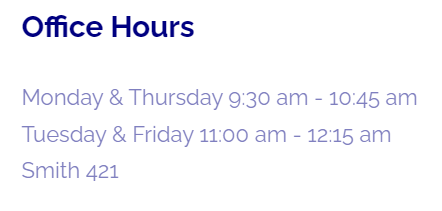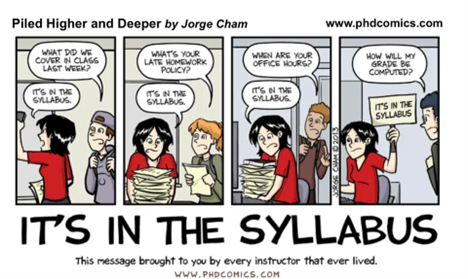Syllabus 101
by Dr. Liz, July 31, 2022

 A syllabus is a document that outlines what you can expect from a college course, and what is expected of you. It tells you everything you need to know about how the course will be run. You will receive a syllabus for each of your courses and reading those syllabi will help you know what to expect during the semester.
A syllabus is a document that outlines what you can expect from a college course, and what is expected of you. It tells you everything you need to know about how the course will be run. You will receive a syllabus for each of your courses and reading those syllabi will help you know what to expect during the semester.
The syllabus is like a contract between you and the instructor. Some will go over it on the first day of class, highlighting important sections and answering questions. Others will just expect you to review it on your own. ALL instructors expect you to read it, and to know what it contains. Some instructors give a quiz or quick assignment about syllabus content to make sure students have read it.
Some instructors put in hidden “Easter eggs” to see if people are actually reading the syllabus – it may tell students to email them a photo or to answer a question, and doing so may even earn them bonus points or some other reward!
Here is some of the standard information you will find on a syllabus, and some tips and tricks for making the most of the information.
Course Information
 All syllabi include the course title, number, section and description. You will see the class location and the days/times it meets. It will list any pre-requisite courses that you should have completed before taking your course. Some syllabi include learning goals – what you should know when the course ends - and methodology – how the information will be presented.
All syllabi include the course title, number, section and description. You will see the class location and the days/times it meets. It will list any pre-requisite courses that you should have completed before taking your course. Some syllabi include learning goals – what you should know when the course ends - and methodology – how the information will be presented.
Instructor Information
 Here you will find the contact information for your professor, teaching assistant, or anyone else involved
in your course. It will list the ways to contact your instructor (email, phone, text). If it only lists one
way, that is their preferred method for student contact! It should also list office hours, which are the
set times they will be in their office and available to meet with students. Most of the time, there are
open hours, and you can just show up. But the syllabus will tell you if you need to make an appointment
first, so read it carefully! Even if office hours are open, you may want to email the instructor and let
them know you will be stopping by and what you want to talk about so they can be prepared. Show up right at
the beginning of open office hours if you can – there may be lots of other students who need help as well.
[Related blog post – Talking to Professors]
Here you will find the contact information for your professor, teaching assistant, or anyone else involved
in your course. It will list the ways to contact your instructor (email, phone, text). If it only lists one
way, that is their preferred method for student contact! It should also list office hours, which are the
set times they will be in their office and available to meet with students. Most of the time, there are
open hours, and you can just show up. But the syllabus will tell you if you need to make an appointment
first, so read it carefully! Even if office hours are open, you may want to email the instructor and let
them know you will be stopping by and what you want to talk about so they can be prepared. Show up right at
the beginning of open office hours if you can – there may be lots of other students who need help as well.
[Related blog post – Talking to Professors]
Required Materials
 This section details exactly what you will need to participate in the course including books, hardware,
software, etc. Once you know a book is required, you may be
able to save money by purchasing a used book or renting a physical or online version. BEFORE YOU PURCHASE
ANYTHING, check that you are getting the correct edition by using the right ISBN number which should be
listed. If available, use the type of book that will work best for you – hard copy, audio, or digital.
Note whether the materials are required or recommended.
This section details exactly what you will need to participate in the course including books, hardware,
software, etc. Once you know a book is required, you may be
able to save money by purchasing a used book or renting a physical or online version. BEFORE YOU PURCHASE
ANYTHING, check that you are getting the correct edition by using the right ISBN number which should be
listed. If available, use the type of book that will work best for you – hard copy, audio, or digital.
Note whether the materials are required or recommended.
Grading and Coursework
This is a really important section. It details how your final grade will be calculated, either using percentages or points. NOTE CAREFULLY if attendance counts toward your final grade and for how much. Think about that every time you want to skip class. This section will also tell you if there will be a big project or group work, as well as how many quizzes, papers, assignments, and exams there will be.
Course Policies
 This is another important section since it details policies specific to a particular course and instructor. This is where you can find information about turning work in late – it may be OK with permission, it may lose points based on how late it is, or it may not be accepted at all. MAKE SURE YOU KNOW THE CONSEQUENCES of turning in late work if you tend to procrastinate! This section will also let you know if the instructor wants you to have phones out of sight, whether or not you can use a computer in class, and any other class-specific rules. This section may also deal with academic honesty, or that might be its own section. Either way, you need to know what honor codes or academic integrity rules your school and instructors use.
This is another important section since it details policies specific to a particular course and instructor. This is where you can find information about turning work in late – it may be OK with permission, it may lose points based on how late it is, or it may not be accepted at all. MAKE SURE YOU KNOW THE CONSEQUENCES of turning in late work if you tend to procrastinate! This section will also let you know if the instructor wants you to have phones out of sight, whether or not you can use a computer in class, and any other class-specific rules. This section may also deal with academic honesty, or that might be its own section. Either way, you need to know what honor codes or academic integrity rules your school and instructors use.
Getting Help
 Your syllabus will probably have a section that details where to get help. Information can be very specific, like the name and contact information of the course’s teaching assistant, or more general, like the website link for peer tutoring, the school’s writing center, the math lab, or academic services. KNOW YOUR RESOURCES and where to go to get help for all of your courses. And ask for help when you need it.
Your syllabus will probably have a section that details where to get help. Information can be very specific, like the name and contact information of the course’s teaching assistant, or more general, like the website link for peer tutoring, the school’s writing center, the math lab, or academic services. KNOW YOUR RESOURCES and where to go to get help for all of your courses. And ask for help when you need it.
Course Schedule
 Some instructors include the course schedule on their syllabi, others provide it as a separate document. Either way, it is the blueprint for your course. It outlines each class, what will be covered, what will be assigned, and what is due. This information keeps you on track and it is important to keep up with all your work. In college, many instructors expect you to do lots of independent reading that they may or may not discuss in class. Make sure to let your instructor know if you are feeling overwhelmed or are falling behind. Tell them sooner rather than later so they can help you before it is too late!
Some instructors include the course schedule on their syllabi, others provide it as a separate document. Either way, it is the blueprint for your course. It outlines each class, what will be covered, what will be assigned, and what is due. This information keeps you on track and it is important to keep up with all your work. In college, many instructors expect you to do lots of independent reading that they may or may not discuss in class. Make sure to let your instructor know if you are feeling overwhelmed or are falling behind. Tell them sooner rather than later so they can help you before it is too late!
Now What?!
Access the syllabus as soon as you can. Some instructors post them online a week before the class starts so students will have time to get the required materials before the course starts. As soon as you receive a syllabus, print it. Read it. Highlight the important parts so you can find them easily later. Add every assignment, project, paper, quiz, and exam date on your calendar or planner. If you see that you have many things due in a single week (like during midterms) check your student manual – some schools allow you to move one exam if you have three due on the same day. Know the policies at your school!

Bonus Tip
Many instructors do not like to be asked questions that are easily answered by looking in the syllabus. Don’t ask “how much is the exam worth” or “when are your office hours” – check the syllabus. It’s in there.
Images:
Scrabble Tiles: https://www.fsedu.com.au/blog/what-exactly-is-a-syllabus/
Student Getting Help: https://www.newyorkcares.org/volunteering/college-access
It's in the Syllabus: https://www.reddit.com/r/Professors/comments/e8kz6g/its_in_the_syllabus_just_post_it_on_your_door/
Specific questions and topic suggestions can be emailed to questions@ADHDinCollege.com.